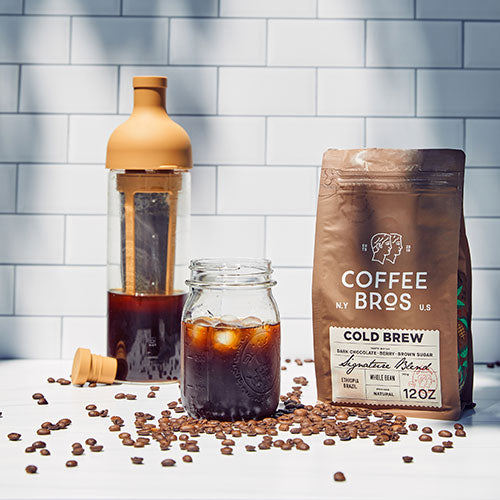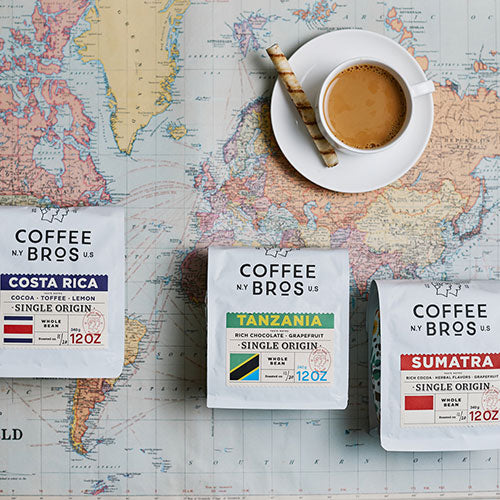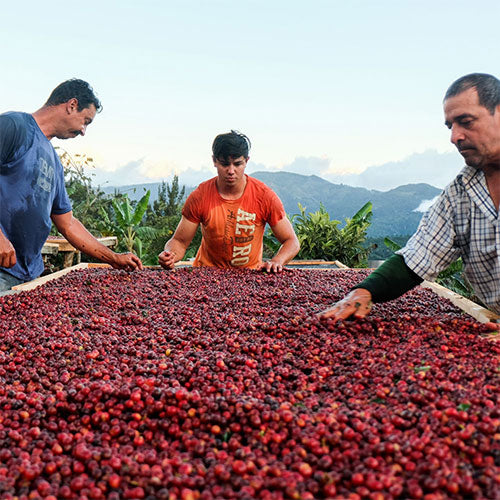The Most Expensive Coffee in the World
Overview
-
What are the factors that influence a coffee being expensive?
- Varietal
- Rarity
- Famous Farm/Producer
- Accolades
- Process
-
Do More Expensive Coffees Taste Better?
- What to look for when evaluating an expensive coffee?
- Who Are Expensive Coffees For?
What are the factors that influence a coffee being expensive?
Varietal:
Specific varietal or cultivars are sought after from the onset due to the brewed cup's expected quality and flavor profile. But what is a varietal, one might ask? Varietal, in simple terms, means that the plant or variety is naturally occurring in the wild.
Those that drink wine are familiar with terms like Merlot and Pinot Noir, these aren't fancy names for the wine, but the variety of grape used to make it.
Coffee stems from two main species of plants, C. arabica and C. canephora (often referred to as Robusta). The species of plants are broken down into subspecies or varietals.
The main difference between a varietal and a cultivar is that cultivars are subspecies produced by horticulture or agricultural techniques and are not typically found in natural populations.
The Coffea genus has over 120 individual species, many highly sought after, such as the Gesha varietal. The Gesha varietal is one extreme example of a coffee species that is highly sought after due to its high cup quality and delicate taste notes. The Gesha variety originated in the coffee forests of Ethiopia and slowly made its way to Panama, where it gained most of its recognition.
Rarity:
Like the varietal, the rarity of certain aspects of coffee help drives up the end price.
Producers themselves can create unique lots, called microlots, which are subsections of their farm that may have quality distinctions from the rest of the farm. These rarer lots of coffee are sought after by importers and roasters due to their characteristics and process differentiation from the main lots. Microlots are priced higher because they are identified as unique from the rest of the farm. Still, they are harvested and processed separately from the main lot, which substantially increases prices.
Another driver of rarity is the origin, and one great example of such is Yemen. Yemen was once the only coffee exporting country in the world and now only represents 0.1% of today’s total supply. If you want to do a deep dive into the story of Yemeni coffee and producers, Qima Coffee and Foundation is a great place to start.
Farmer and Producer:
Believe it or not, there are such things as “celebrity farmers” in the industry that garner higher prices than a producer who is far less known. The access to a broader market, countless accolades, direct marketing, and a well-built brand define a famous producer. This is not to say that coffee from a renowned farm isn’t great; it is often priced above market value for the quality. Think of the t-shirt you might be wearing versus a similar quality one from a high-fashion brand; this is partially what is being priced.
Accolades:
The accolade of the producer plays a huge part in the final sale price of their lot. Those producers who are fortunate enough to participate in competitions like the Cup of Excellence or the Colombia Land of Diversity auction can expect premiums on their lots of upward of 100%.
The Cup of Excellence is one of the most well-known coffee competitions in the world where winning coffees are sent to the Alliance for Coffee Excellence auctions. These winning coffees carry on the accolades through the competition which often draws attention to their farm. First-time Cup of Excellence winners sees this as a game-changing experience, not only from the additional funds raised during the auction but the long-term impact of being among the few in their country to win this competition.
Process:
Another significant factor that drives prices is how the coffee was processed post-harvest. Most coffee enthusiasts are familiar with terms such as Natural or Washed coffees. These terms loosely define how the coffee was processed post-harvest and define the coffee expected flavor profile.
There are many unique ways of processing coffee that may not be known to the average coffee consumer. One such processing method is Anaerobic fermentation (dry fermentation), taken from the wine-making industry. Coffee producers now use similar techniques to impart unique flavor profiles and aromatics to their coffees. Many of the highest-scoring coffees in recent Cup of Excellence auctions are processed using anaerobic fermentation.
There is also the Honeyed processed coffee which is a bit of a combination of the washed and natural methods. Honeyed processed coffee retains many desirable characteristics of a full Natural coffee but has a much quicker drying process. You can expect unique flavor profiles from honey processed coffees, such as the “Mango” Honey Processed coffee from Finca Idealista of Nicaragua. This coffee boasts a big mango flavor note due to the honey process with highlights of pineapple, a wonderful and one-of-a-kind coffee.
Do More Expensive Coffees Taste Better?
You came to the wrong place if you’re looking to find how the Kopi Luwak (cat poop coffee) tastes. Just because a coffee is expensive, it doesn’t necessarily mean that it tastes better than the rest. If you read back to what factors impact coffee price, only a few correlate to flavor. A good portion of the influence on price is extraneous when concerning taste. Think again of that example where your high-fashion brand t-shirt may not necessarily fit or feel better than a moderately priced alternative.
In most extreme cases, yes, more expensive coffee should taste better as quality often follows price. The more notable varietals are also grown at higher elevations and tend to have more sweet, subtle, and delicate flavor notes. Producers who also spend adequate time evaluating and iterating their post-harvest processing see better results and more interesting/consistent flavor profiles.
What to look for when evaluating a coffee for taste (even the expensive ones):
- Farm or Producer Information: Coffee roasters that can speak to the producer, farm, and their processing methods often mean they went above and beyond to acquire that coffee. When a roaster can identify a farm, it often means they or their importer have a more direct relationship with the producer. The great thing about more direct relationships is that it is exactly that, a relationship, one that is built on over years. Great relationships lead to processing innovation, shared ideas, and ultimately better-tasting coffee.
- Processing method: A thorough description of the processing method usually means that the producer is going above and beyond standard practices. You may find information about, raised drying beds, 24-hour fermentation, double fermentation, carbonic fermentation, and so on!
- Post-processing care: Post-processing prep and care truly comes down to how the coffee leaves the farm and arrives at the purchasing country (ultimately the roaster). The foundation of any good shipping program is one that involves hermetically sealed bags (GrainPro is one that we always look for). The GrainPro bags are an extra layer beneath coffee's traditional burlap sacks which help prevent odors, mold, or moisture buildup. The extra layer means that coffee will maintain its quality and freshness longer than coffee arriving solely in a burlap sack.
Who Are Expensive Coffees For:
For you, me, your aunt, my neighbor, and anyone else who can afford or are interested in expanding their coffee bragging rights. Expensive, ethically sourced, and beautiful tasting coffees can be for everyone. While not everyone can enjoy a $50 bag of coffee every week, consider a purchase for a special occasion or a gift for your coffee connoisseur or barista friend.
Our customers tend to treat the more expensive coffees like a fine bottle of wine, they are usually purchased for a special occasion for yourself or others! Not to mention, most well-sourced expensive coffees are pricey for a reason, and that reason usually defaults to a mind-blowing flavor experience.




